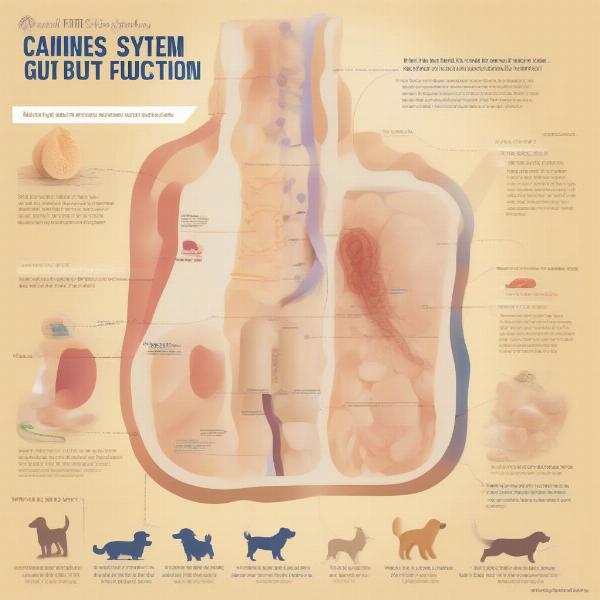Madra dog food may not be a widely recognized brand in the global pet food market, but the search term itself reveals a desire for information about quality dog nutrition. This guide aims to provide a detailed overview of essential aspects of dog nutrition, helping you make informed choices for your furry friend, regardless of the specific brand you choose.
Deciphering Dog Food Labels: Key Nutrients and Ingredients
Understanding dog food labels is crucial for selecting a diet that meets your dog’s specific needs. Look for a guaranteed analysis that lists minimum percentages of crude protein, crude fat, crude fiber, and moisture. Ingredients are listed in descending order by weight, so the first few ingredients indicate the primary components of the food.
Protein Powerhouse: Essential for Growth and Repair
Protein is the building block for muscles, tissues, and organs. High-quality dog food should feature animal-based protein sources like chicken, beef, lamb, or fish as the primary ingredients. Puppies and active dogs require higher protein levels than adult dogs with less demanding lifestyles.
Healthy Fats: Fueling Energy and Supporting Coat Health
Fats provide a concentrated source of energy and support healthy skin and a shiny coat. Essential fatty acids like omega-3 and omega-6 are crucial for brain function and immune system health. Look for sources like fish oil, flaxseed oil, or chicken fat.
Fiber for Digestion: Promoting Gut Health
Fiber aids in digestion and promotes regular bowel movements. Sources like beet pulp, brown rice, and fruits and vegetables contribute to a healthy digestive system.  Importance of Fiber for Dog's Digestive Health
Importance of Fiber for Dog's Digestive Health
Choosing the Right Food for Your Dog’s Life Stage
Different life stages require different nutritional profiles. Puppies need higher calorie and protein diets to support rapid growth, while senior dogs may benefit from lower calorie, higher fiber formulas.
Puppy Power: Fueling Growth and Development
Puppy food should be rich in protein, calcium, and phosphorus to support bone and muscle development. Small breed puppies may require smaller kibble sizes for easier chewing.
Adult Maintenance: Sustaining Health and Vitality
Adult dog food formulations focus on maintaining a healthy weight and providing balanced nutrition for optimal organ function.
Senior Support: Addressing Age-Related Needs
Senior dog food may contain added glucosamine and chondroitin to support joint health and may have adjusted calorie levels to prevent weight gain.
Special Dietary Considerations: Allergies and Sensitivities
Some dogs have food allergies or sensitivities that require specialized diets. If your dog experiences digestive upset, skin issues, or other symptoms after eating, consult your veterinarian. They can help you identify potential allergens and recommend an appropriate hypoallergenic or limited ingredient diet.
Madra Dog Food Alternatives: Exploring Reputable Brands
While information on Madra dog food is limited, there are many other reputable brands that offer high-quality dog food. Consider brands that prioritize high-quality ingredients, balanced nutrition, and are backed by research and veterinary expertise.
Conclusion: Making Informed Choices for a Healthier, Happier Dog
Choosing the right dog food is essential for your dog’s overall health and well-being. By understanding key nutrients, life stage requirements, and potential dietary restrictions, you can make informed decisions that contribute to a longer, healthier life for your furry companion. Remember to consult with your veterinarian for personalized advice based on your dog’s individual needs.
Frequently Asked Questions (FAQ)
- How often should I feed my dog? This depends on your dog’s age, breed, and activity level. Consult your veterinarian for guidance.
- What are the signs of a food allergy in dogs? Common signs include itching, skin rashes, digestive upset, and ear infections.
- Is grain-free dog food always better? Not necessarily. Some dogs thrive on grain-free diets, while others do better with grains. Talk to your veterinarian.
- How can I transition my dog to a new food? Gradually mix the new food with the old food over several days to avoid digestive upset.
- What should I do if my dog won’t eat their food? Consult your veterinarian to rule out any underlying medical issues.
- Are homemade dog food diets safe? Homemade diets can be challenging to balance nutritionally. Consult a veterinary nutritionist for guidance.
- How do I store dog food properly? Store dry food in a cool, dry place in an airtight container. Refrigerate opened canned food.
About ILM Dog:
ILM Dog is your trusted international resource for comprehensive dog care and breeding information. We offer expert advice on everything from breed selection and puppy care to senior dog health and nutrition. Our goal is to empower dog owners worldwide with the knowledge and resources they need to provide the best possible care for their beloved companions. Contact us for personalized guidance: Email: [email protected], Phone: +44 20-3965-8624. Visit us at ILM Dog for more information.